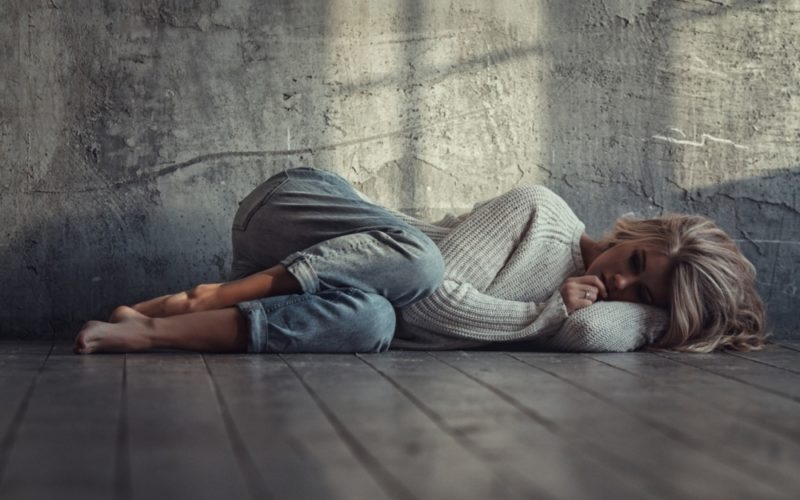The state of depression and despondency is familiar to many. I don’t want to do anything, a person does not see good either in the present or in the future. Such manifestations, existing against the background of constant or alternating stresses, cause a depressed state, a deficiency of the hormone of happiness arises. How to get rid of depression on your own - the advice of a psychologist will help eliminate this unpleasant ailment.
Material Content:
What is depression in simple words
Depression is a mental disorder. A person loses the ability to enjoy life, his mood is constantly bad, nothing pleases.
Self-esteem usually suffers, thoughts appear: “I do not represent anything. I am to blame for all my failures. ”
Symptoms are manifold. Often the appetite is disturbed. In severe form, it can disappear altogether, the patient rapidly loses weight, which becomes a cause for new worries. But sometimes the opposite happens - some people “jam” depression. A constant feeling of satiety gives them a sense of imaginary calm, I want one thing - to fall asleep.
It becomes difficult for a person to engage in habitual activities; he performs any work through force.
Causes and risk groups
Why can depression begin?
This type of disease is caused by objective circumstances:
- abuse, stress;
- death of a loved one or parting with him;
- severe illness;
- a sharp change in lifestyle - the birth of a child, moving, loss of work;
- a conflict situation, a problem that cannot be resolved;
- genetic predisposition.
The risk group includes:
- lonely people;
- Persons suffering from a serious illness - for example, oncology;
- socially unprotected population - unemployed, poor;
- those who have bad habits use drugs and alcohol.
- women experiencing a difficult period - recovery after childbirth, divorce, treason.
Depression should be taken seriously and all measures taken to overcome it.
Psychologist's tips on how to get rid of depression yourself
A lot of things in this situation can be done by a person himself, without drugs and therapeutic measures. It is important not to put off so that the disease does not become protracted.
How to deal with postpartum depression
It would seem that the main test is over - the baby was safely born, mother and child returned home. Why, then, tears come to the woman’s eyes, she becomes irritable, picky, it’s hard for others to communicate with her.
The reasons for this are understandable:
- In the body of a young mother after birth, a hormonal "storm" occurs. The doctor may advise taking medications that will not harm the child.
- A woman must be given time to get enough sleep. If the baby cries at night, then the mother should be able to nap during the day. Taking care of this is the duty of loved ones. In an extreme case, it is advisable to invite a nanny. Remember that physical (and even nervous) exhaustion is one of the main causes of postpartum depression.
- An important role is played by good nutrition, which contributes to the restoration of strength after childbirth. The diet of the mother, especially if the woman is breastfeeding, should contain all the necessary substances. The vitamin and mineral complex will also help.
- No need to try to be a “supermother” from day one. This will require too much energy and physical expense, which will inevitably lead to depression. You can postpone the washing for tomorrow, prepare a simple lunch. You should always remember that now you have not the easiest period in your life, therefore you need to give yourself concessions.
- Do not lock in 4 walls. At least a couple of times a week, put on an elegant dress, make yourself up, go for a walk, go visit for an hour. Do not worry about the inevitable changes in the figure. If you eat right, you will soon be in good shape.
The positive emotions that you will get during even a short exercise, reading a book, talking with friends, will become your main assistants in the fight against spleen. For such methods of overcoming the arisen condition, no medicine is needed - only your own desire and willpower!
If the disease is severe
When depression is severe, a visit to the doctor is required. Perhaps the person will not be at all disposed to such a visit. In this case, the consultation should be organized by relatives, friends.
Severe depression is self-absorption, slow speech, inhibited movements, often suicidal thoughts.
The psychiatrist can refer the patient for examination. It is required to exclude diseases of the heart and blood vessels, traumatic brain injuries, various types of intoxication. And also the doctor will probably recommend contacting a psychologist.
The specialist will select a course of antidepressants for the patient. Everything here is very individual, and drinking on your own initiative that "helped a friend" is by no means possible.
How can a person help himself in this situation:
- It is necessary to strictly fulfill all the appointments of doctors. This applies to the daily routine and, of course, medication. Most antidepressants have a cumulative effect - that is, the patient will notice a change for the better not after taking 1 tablet, but on 7-14 days from the start of the course. This should be remembered and in no case do not stop taking medications on the grounds that they "do not help."
- If a psychologist starts working with you, you should not miss these sessions.Together with an experienced specialist, you will calmly understand the causes of the disease and how to overcome it. It takes a long work, so it is advisable to tune in to a positive result.
- The task of relatives at such a time is to be attentive to the patient. This does not mean that you need to show excessive tenderness and release a person suffering from depression from all household duties. Lying and looking at the ceiling is not the best thing. An equal and friendly attitude of others, feasible work, a well-established daily routine - this is what is needed in this situation.
Especially careful and caring for a person who is visited by suicidal thoughts, should be close to him. If the patient is not hospitalized, it is necessary to arrange so that he does not remain alone. In any case, until the medicines work.
How to get rid of autumn blues
Many people suffer from depression in the fall. And it can leak in a latent form. It seems to be nothing serious - seasonal spleen. I constantly want to sleep, or at least lie under a warm blanket. The mood is unimportant, there is no desire to take on something new, and even everyday work is difficult.
The day is getting shorter - there is not enough light for the body, there is a lack of vitamins, in inclement weather people almost never leave the house.
But helping yourself is not so difficult:
- Do not miss a single fine day. If there is no way to go outside - at least expose your face to the sun. Replace the lighting lamps and yourself in the apartment with more powerful ones. Add bright colors to the interior - an orange bedspread on the bed, lemon-yellow curtains, more indoor plants. May the eternal “summer” reign in your home!
- In autumn, it is worth changing the mode of the day. Allow yourself to sleep 1-2 hours longer. Someone will lie down early, and some will take a nap for a short while after dinner. This will prevent a feeling of chronic fatigue.
- Review the diet. Replace a cup of coffee with a glass of juice or herbal tea. Buy vegetables and fruits.
- Be sure to arrange yourself physical activity. For some, visiting the pool or doing fitness classes is useful, while others will limit themselves to morning exercises. In any case, the body will receive a boost of energy, and it will become easier to fight the autumn depression.
- Autumn is not a reason to refuse visits to friends, “sorties” to performances, concerts or premieres of films. Classical music calms the nervous system perfectly - why not take tickets to the philharmonic?
- If you already know that it’s hard to endure the autumn inclement weather, plan a vacation for this time and go somewhere to sleep.
Climate change is always beneficial.
Depression with Apathy and Anxiety
This is a rather serious condition. Patients describe it in different ways: oppressive longing, causeless anxiety, suspiciousness, various phobias like fear of getting cancer, a feeling of complete helplessness. Elderly people tend to mentally sort out cases from their past, often at the same time experience their own guilt or resentment of fate.
It is necessary to get rid of anxiety, depression and irritability - these feelings truly poison life.
Usually patients feel melancholy in the morning, and the feeling of anxiety intensifies toward night. Often tormented by insomnia, and the next day comes the turn of weakness, weakness, apathy.
If all these manifestations are strongly expressed, it is better to talk with a psychologist, psychotherapist. Hypnosis has a positive effect.
Vitamin B is prescribed for patients. The herbal preparation “Deprim” successfully fights insomnia and apathy, “Nootropil” helps to improve brain function. Tincture of lemongrass, ginseng are excellent natural stimulants.
It is important not to wait for such a state to pass by itself, but to take measures to return to normal life as soon as possible. To get rid of depression and apathy is a feasible task.
Depression Prevention
Anyone who has already experienced this condition would not want to plunge into it again someday.
What psychologists advise in this case:
- Normalize sleep. Only then will forces begin to return to you. There are many ways to deal with insomnia. Someone needs a walk in the fresh air, a warm bath, an infusion of valerian. Others need to work physically to sleep soundly in the evening. Well, someone will not do without prescription drugs.
- Eat right. Food should be easily digested, not burden the stomach. Buy a vitamin and mineral complex at the pharmacy. But to cheer yourself up with coffee, or to “calm down” with a glass of alcohol - absolutely not. Such habits for the body are akin to a whip for a horse exhausting from fatigue. The effect will be short, and then it will get worse.
- Excessive workloads should be avoided. Keep a steady pace of activity - without stress and rush. Show what you are capable of later, when the forces return. In the meantime, remember the banal truth - "you won’t earn all the money."
- Try to compare the situation in which you find yourself with the situation of other people. In order not to “collapse” into depression, someone volunteers in a hospital or starts helping a lonely old woman in the neighborhood, collecting things for refugees or homeless people.
- Try to find something positive in your current situation. Lost your job? Maybe it’s worth a little rest, take a breath, and then finish the courses, start working on a new specialty. Divorced? But the psychological pressure has gone, the quarrels, the clarification of relations have stopped. It is likely that an interesting person will appear in your life, and that he will become a faithful and reliable friend. It is not in vain that they say: “When God wants to open a new door before us, he closes the previous one.”
- Set goals that you will be pleased to reflect on. For example, plan a trip. Think about where you want to go, imagine this wonderful place, take at least a small step towards your dream. Find out how much the tours cost, choose the most attractive option for you.
Then, waking up on one really beautiful morning, you will think that life is good, you will understand that there is no trace of a bad mood. Getting out of depression on your own is a task that can be successfully solved.



















